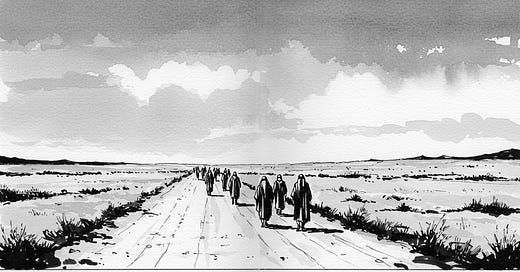
No Refuge: Israel Is Not What They Told Us
Another childhood story vanishes in the face of reality.
Like millions of young Jews in the West, I was raised with beliefs about Israel that haven’t aged well. We were told, for example, that it was “a land without a people for a people without a land.” We were never told that people had lived on that land for many generations, then violently evicted to make way for the new state.
It can be painful to examine and discard long-held beliefs. But it’s a moral duty.
Now, a right-wing Zionist group’s new campaign underscores the need to discard yet another childhood belief. The group recently announced that it has “submitted a list of names of Diaspora Jews who we recommend be banned from Israel.”
That thought of banning Jews from Israel may surprise some people, but it’s been going on for years. Norman Finkelstein, the child of Holocaust survivors, was deported and barred from returning in 2008. Noam Chomsky was refused entry into Israel in 2010.
The Knesset (Israeli parliament) made this practice official in 2107 by banning anyone—Jew or non-Jew—who calls for boycotting Israel or its illegal settlements on Palestinian land.
That undermines yet another story we were told: that Israel was our “birthright,” something we earned in absentia through the suffering of our forebears. It was a place of safety, we were told, created for us after the horrors of the Holocaust. We had a right to return there, they said.
That’s the word they used: “return.”
Another word they used was “refuge.” They’re still using it, in fact. Take Sen. Chuck Schumer. (Please...)
“I believe there should be a place of refuge for the Jewish people,” said Schumer. The senator from New York also declared that Israel is the Jewish people’s “hard-won land of refuge.”
We didn’t understand that you can’t ethically create one group’s refuge by turning hundreds of thousands—now millions—of other people into refugees.
And, as we know now, Israel is not a refuge for the Jewish people. It’s a refuge for some people of Jewish extraction—the ones who refrain from saying forbidden things. Others, Jews and non-Jews[1] alike, are banned because they spoke forbidden words.
They told us Israel was the Jewish homeland. Home? The poet Robert Frost wrote, “Home is the place where, when you have to go there, they have to take you in.” How can anyone claim that Israel is “a Jewish homeland” when any Jew in the world can be banned in a heartbeat for their speech?
The first Jew banned under the 2017 law was a rabbi—Rabbi Alissa Wise, then Deputy Director of Jewish Voice for Peace (JVP). The ban has since been extended to JVP itself, which at last report claimed a membership of 32,000 people—most, if not all, Jewish—as well as Code Pink and other activists and groups. They include both Jews and non-Jews.
Many of these blacklisted Jews have said they were inspired by the Jewish concept of tikkun olam— healing the world. Their stance on boycotts is an expression of their Judaism.
They weren’t banned from Israel despite being Jews. They were banned because they are Jews—ones whose Judaism compels them to challenge the political and military force of the state. That ban is the act of a political project, not a communal one.
Irony upon irony: These Jews are barred by law from entering Israel, but not Lebanon, Egypt, Saudi Arabia, Indonesia, Pakistan, or most other Muslim-majority countries. The only nation in the world that unilaterally refuses these Jewish activists is the so-called “Jewish state.”
Former Israeli Prime Minister Yair Lapid unwittingly offered more evidence against the concept of Jewish refuge in 2013. Lapid was well-viewed at the time among centrist American politicians, especially liberals, because he knew how to sound moderate on Palestine. Lapid has promoted severe military oppression[2], challenged freedoms of press and speech[3][4], condemned peaceful international institutions[5][6], and failed to speak against Netanyahu’s actions.[7]
It was certainly unintentional, therefore, when Lapid underscored the falsehood of the “refuge” idea.
“Israel was founded as a refuge for the Jewish people,” Lapid said in a PBS interview, “but today it isn’t a safe place. It is safer to be Jew in New York.”
He’s right. A nation that relies on occupation and war can never be safe.
As children, most of us were inculcated with generally liberal values. Our parents and teachers cheered, for example, when federal troops challenged the racist governors of Southern states. Why? Because they were morally opposed to any government that enforced one ethnic group’s dominance over another.
They didn’t see the contradiction; we had to discover it for ourselves.
For his part, Schumer is currently flacking a new book which promotes a highly politicized definition of “antisemitism”—one that conflates criticism of a state with hatred toward a people.
That raises a question: What word would Schumer and his ilk use for a state that bans Jews from entry because of the way they practice their Judaism?
A refuge built on injustice is no refuge at all.
[1] This law (technically an amendment to Israel’s law of entry) has also been used to ban elected officials from the United States and United Kingdom—again, solely because of their political views. (We were told Israel is a democracy, too. So much to unlearn!)
[2] “Lapid charms the lefties at NY’s 92nd Street Y,” Times of Israel https://www.timesofisrael.com/lapid-charms-the-lefties-at-nys-92nd-street-y/
[3] Years later, Lapid openly condemned press freedom in Israel/Palestine. “If the international media is objective and shows both sides,” said Lapid, “it serves Hamas.”
[4] “Lapid begins campaign against BDS,” Jerusalem Post, https://www.jpost.com/Israel-News/Politics-And-Diplomacy/Lapid-begins-campaign-against-BDS-437402
[5]How UNESCO erases history, by Yair Lapid. https://blogs.timesofisrael.com/how-unesco-erases-history/
[6] The United Nations has lost it, by Yair Lapid. https://blogs.timesofisrael.com/the-united-nations-has-lost-it/
[7] “In an hourlong conversation, Mr. Lapid offered no criticism of Mr. Netanyahu,” New York Times, https://www.nytimes.com/2013/05/20/world/middleeast/fresh-israeli-face-plays-down-political-decline.html?pagewanted=all








